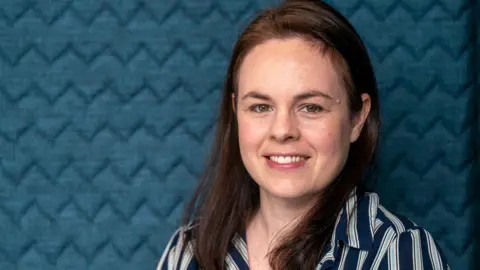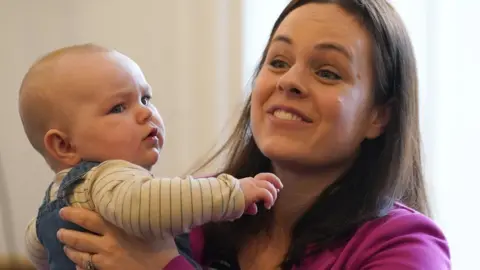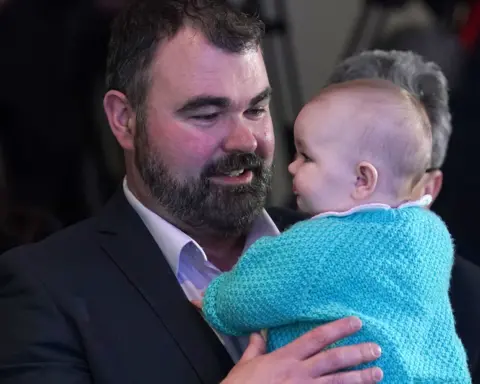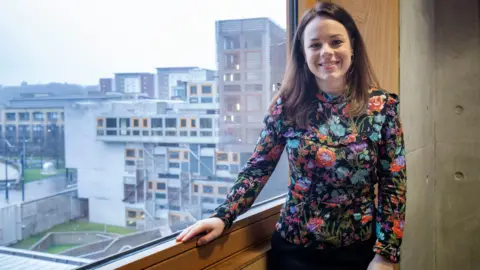Forbes 'astonished' at lack of support for postnatal depression
 PA Media
PA MediaDeputy First Minister Kate Forbes has revealed her "astonishment" at how little understanding there is of postnatal depression.
The MSP for Skye, Lochaber and Badenoch, who has spoken out in the past about her own experience of the illness, also admitted her shock at the lack of resources and research into pregnancy and women's health issues.
In a new podcast she also suggests that frontline workers like midwives could benefit from top-up training to support the mental health of mothers in the immediate aftermath of labour.
Ms Forbes, who gave birth to her daughter Naomi in August 2022, was speaking candidly in the first episode of the Speaking of Suicide podcast from Mikeysline, an Inverness mental health charity.
She said: "I am still astonished by the lack of understanding of an issue that affects so many people.
"I’m genuinely astonished by how little resource and research there is into pregnancy and women’s health issues in and around pregnancy, considering the impact it has on thousands and thousands of women.
"It wasn’t that many years ago that it would have been dismissed as the baby blues.
"For some women, it comes and goes, it’s a day of emotional challenge and for some women, it descends very rapidly into something extremely serious. I have to commend NHS Highland, the midwives and the doctors - they really couldn’t have done more and I think that is rare based on what other women have shared with me."
 PA Media
PA MediaPostnatal depression affects one in 10 women within a year of giving birth, according to the NHS, and suicide is a leading cause of maternal death during the year after birth.
Ms Forbes shared more details about her struggle with the crippling condition, and the feeling that her baby would be better off without her.
“I got home and that’s when the sort of night terrors and the day terrors started," she said.
"I was overwhelmed by fear for the baby’s health - I assumed I would be the person that would cause her pain and suffering and therefore it would have been better for me to be elsewhere."
She said she was convinced someone was going to cause them harm.
"I'd go to have a shower but I'd have to have a 30-second shower because I was convinced someone was going to enter the bathroom with a machete or something - it's absurd - but there are no facts that can counteract what you believe so strongly," she said.
"As a politician, I suppose I’m a professional at putting a smile on and giving the right answer irrespective of how you feel inside. I did that for a while and I just continued to not sleep at all.
"Within a week, I couldn't even speak without tears and it all came out."
When husband Ali MacLennan read out a checklist of postnatal depression symptoms, and then her midwife intervened, Ms Forbes realised what was going on.
 Ruaraidh White
Ruaraidh WhiteShe told the podcast she wanted to speak about her experience because of the number of women going through the same thing and "the number who don't get help and where that leads them".
Having spent her career at the top of her game and being well prepared for anything, she said the reality of becoming a mum was nothing like the expectation.
A difficult and traumatic labour left her feeling out of control.
She said: "I thought if I kept breathing, if I kept moving, kept positive and in control it would be fine.
"But I didn't count on a baby's heartrate almost disappearing, I didn't count on starting to lose blood, I didn't count on the room filling with professionals and I didn't count on interventions - you can start to see the experience of being out of control."
Speaking to the podcast - published on Thursday - Ms Forbes said she felt a cultural change was needed to make a difference, including a reform to services from her own government.
In May, Scotland’s healthcare watchdog released the first new guidelines for perinatal mental health in over a decade.
The guidelines, developed by Healthcare Improvement Scotland (HIS), included versions for both patients and healthcare professionals in a bid to improve care and reduce stigma.
 PA Media
PA MediaMs Forbes said: "We have been on a journey in terms of the funding invested and the recruitment required but I also think there’s something there about making every issue also a little bit about mental health.
"A midwife is trained in delivering a baby, not necessarily trained in supporting the mental health of the mother, but she’s probably also best placed to support the mental health of the mother in the immediate aftermath of giving birth and looking for signs."
She also suggested "top up training" for frontline workers to be able to support new mothers.
"This is a principle that’s applicable - if you’ve been through cancer diagnosis, who supports you with the mental health impact? If you’ve been through a bereavement, who is the first point of contact to support you on the mental health side?
"There is something there about top up training for the frontline workers who will support you on the substance of the issue and then help you deal with the aftermath of the issue."
This is clearly a subject that the deputy first minister feels very strongly about. But it's worth pointing out that she's a senior member of a government that pledged to improve perinatal and infant mental health services back in 2019.
Since then, the government says it has worked to develop specialist community services for women experiencing mental illness in pregnancy and after giving birth, and invested in Mother and Baby units for the most serious cases.
The Perinatal and Infant Mental Health Fund was launched in March to expand services and offer more support and counselling. Meanwhile Scotland’s healthcare watchdog recently released new guidelines for both patients and healthcare professionals in a bid to improve care and reduce stigma.
So it's a bit surprising for a senior government minister to say they are "astonished" by a lack of resources in this area. Fortunately Kate Forbes is in a powerful position to help change that situation.
